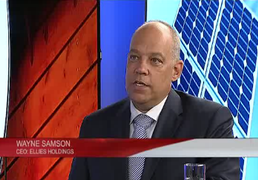SA HAS been rated one of the worst-performing African country in terms of entrepreneurship.
According to the latest Global Entrepreneurship Monitor report released this week, which tracks entrepreneurship and business activity around the world, the top-performing African economies with regard to entrepreneurship are Botswana and Senegal.
Although the National Development Plan (NDP), a government blueprint for eliminating poverty and reducing inequality, has ambitious goals for the small and medium enterprises (SME) sector in SA — including a target of 90% of employment opportunities to be created by this sector by 2030 — entrepreneurs continue to face many challenges such as red tape, a lack of access to finance and credit lines, and the generally high cost of doing business.
Global Entrepreneurship Monitor executive director and report author Mike Herrington said this week that there seemed to be growing optimism around entrepreneurship in SA, but that the country had not seen this translate into numbers of new and established businesses.
The report shows that 73% of adults in SA see entrepreneurship as a good career choice and about 45% of the working-age population feel they have the ability to start a business — yet just 9.2% go on to do so.
"It is critical that we get the enabling framework for entrepreneurship right in the country to allow untapped entrepreneurial potential to emerge," Mr Herrington said.
In 2015, 62 economies around the world participated in the study including eight African countries (Botswana, Burkino Faso, Cameroon, Egypt, Morocco, Senegal, SA and Tunisia).
The best-performing African countries, Botswana and Senegal, both exhibited an upward trend year-on-year in terms of the number of adults starting new business (33% and 38.6% respectively).
Mr Herrington said it was important that countries support SMEs because in general it was such businesses that created much-needed jobs and fuelled economic growth and development.
The survey data show that one of the key factors contributing to small business failure across all economies was a lack of profitability. About one-third of those who discontinued their business cited a lack of profitability as a factor.
Mr Herrington said key points policy makers needed to address, especially in Africa, included enriching the availability and variety of funding sources via appropriate regulatory frameworks that enabled new funding schemes to prosper, as the US had done with crowdfunding; continuing with the reform of regulatory systems to make it easier to start and run a business, and expanding infrastructure, especially IT and education.
Ben Bierman, chief financial officer at Business Partners, a specialist risk finance company for formal SMEs, said that if the recent state of the nation address by President Jacob Zuma were anything to go by, the government was aware that a huge layer of bureaucracy was stifling entrepreneurship.
"This is a perennial problem that must be addressed to make small business grow faster. Our plea to government is to look at slashing red tape, and to make sure that the remaining compliance rules that are truly necessary are implemented efficiently, effectively and with quick turnaround times," said Mr Bierman.
He also said despite the constraints on the national budget, he believed there was a strong argument to be made for setting aside some money that could be used as an emergency fund for deserving small businesses that otherwise would fail in the difficult year ahead.
The Democratic Alliance (DA) said on Thursday it would soon introduce a Red Tape Impact Assessment Bill in Parliament to accelerate small business growth.
The party said: "Small businesses have the potential to be the engine for job creation, but SA has one of the highest failure rates for start-ups and entrepreneurs. Reducing the burden on small businesses stemming from overregulation has become an important policy objective in economic growth strategies across the world."
Ultimately the bill aims to create an enabling environment that will stimulate small business growth and create jobs, the DA said.

A trader sorts a basket of tomatoes at the Yankaba market in Kano, northern Nigerian, on Friday. Picture: AFP
SA HAS been rated one of the worst-performing African country in terms of entrepreneurship.
According to the latest Global Entrepreneurship Monitor report released this week, which tracks entrepreneurship and business activity around the world, the top-performing African economies with regard to entrepreneurship are Botswana and Senegal.
Although the National Development Plan (NDP), a government blueprint for eliminating poverty and reducing inequality, has ambitious goals for the small and medium enterprises (SME) sector in SA — including a target of 90% of employment opportunities to be created by this sector by 2030 — entrepreneurs continue to face many challenges such as red tape, a lack of access to finance and credit lines, and the generally high cost of doing business.
Global Entrepreneurship Monitor executive director and report author Mike Herrington said this week that there seemed to be growing optimism around entrepreneurship in SA, but that the country had not seen this translate into numbers of new and established businesses.
The report shows that 73% of adults in SA see entrepreneurship as a good career choice and about 45% of the working-age population feel they have the ability to start a business — yet just 9.2% go on to do so.
"It is critical that we get the enabling framework for entrepreneurship right in the country to allow untapped entrepreneurial potential to emerge," Mr Herrington said.
In 2015, 62 economies around the world participated in the study including eight African countries (Botswana, Burkino Faso, Cameroon, Egypt, Morocco, Senegal, SA and Tunisia).
The best-performing African countries, Botswana and Senegal, both exhibited an upward trend year-on-year in terms of the number of adults starting new business (33% and 38.6% respectively).
Mr Herrington said it was important that countries support SMEs because in general it was such businesses that created much-needed jobs and fuelled economic growth and development.
The survey data show that one of the key factors contributing to small business failure across all economies was a lack of profitability. About one-third of those who discontinued their business cited a lack of profitability as a factor.
Mr Herrington said key points policy makers needed to address, especially in Africa, included enriching the availability and variety of funding sources via appropriate regulatory frameworks that enabled new funding schemes to prosper, as the US had done with crowdfunding; continuing with the reform of regulatory systems to make it easier to start and run a business, and expanding infrastructure, especially IT and education.
Ben Bierman, chief financial officer at Business Partners, a specialist risk finance company for formal SMEs, said that if the recent state of the nation address by President Jacob Zuma were anything to go by, the government was aware that a huge layer of bureaucracy was stifling entrepreneurship.
"This is a perennial problem that must be addressed to make small business grow faster. Our plea to government is to look at slashing red tape, and to make sure that the remaining compliance rules that are truly necessary are implemented efficiently, effectively and with quick turnaround times," said Mr Bierman.
He also said despite the constraints on the national budget, he believed there was a strong argument to be made for setting aside some money that could be used as an emergency fund for deserving small businesses that otherwise would fail in the difficult year ahead.
The Democratic Alliance (DA) said on Thursday it would soon introduce a Red Tape Impact Assessment Bill in Parliament to accelerate small business growth.
The party said: "Small businesses have the potential to be the engine for job creation, but SA has one of the highest failure rates for start-ups and entrepreneurs. Reducing the burden on small businesses stemming from overregulation has become an important policy objective in economic growth strategies across the world."
Ultimately the bill aims to create an enabling environment that will stimulate small business growth and create jobs, the DA said.


























Change: -0.74%
Change: -0.92%
Change: 0.68%
Change: -0.76%
Change: -2.56%
Data supplied by Profile Data
Change: -1.25%
Change: -1.14%
Change: -0.74%
Change: 0.00%
Change: -1.25%
Data supplied by Profile Data
Change: -0.09%
Change: -0.23%
Change: -0.17%
Change: -0.15%
Change: -0.22%
Data supplied by Profile Data
Change: -0.34%
Change: -0.74%
Change: -0.79%
Change: -0.40%
Change: -0.39%
Data supplied by Profile Data